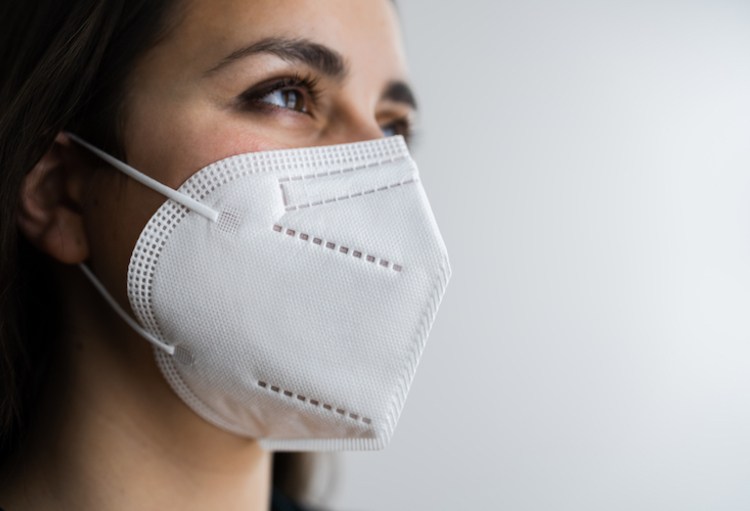In the ongoing battle against new coronavirus variants, the masks that we use are a key line of defence that can be quickly improved. Increasingly, there are recommendations to switch the regular cloth masks for an FFP2 one; in some places this is even required.
Since the last Consultative Committee on 6 January, supermarkets, pharmacies and DIY stores have seen a sharp increase in demand for FFP2 masks – as the GEMS experts recommended wearing them for use on public transport.
Are FFP2 masks better than cloth ones?
Yes, FFP2 masks provide a better layer of protection and capture 94% of particles. An FFP2 mask is made of material that is better at filtering particles from the air, both when breathing in and out, meaning you protect both yourself and others when wearing it.
In December, the German Max Planck Institute for Dynamics and Self-Organisation published the results of a study on the importance of wearing a mask. It showed that if someone who is not wearing a face mask is three metres away from an infected person indoors who is also not wearing a mask, they are almost 100% certain to be infected after 20 minutes.
Yet if both wear a surgical mask, the probability of disease transmission drops to 10% after 20 minutes.
Strikingly, FFP2 masks are hugely more effective than standard surgical masks. In the above scenario, the chance of infection after 20 minutes would drop to 1 in 1,000 (0.1%) provided that both were wearing the FFP2 masks correctly. Even if the FFP2 masks fit poorly, the chance is still only 4 in 1,000 (0.4%).
Related News
- Army deployed to reinforce Flemish nursing homes
- 111 academics denounce 'tunnel vision' of Belgian government and virologists
- Omicron wave 'comes closer to flu,' says Van Ranst
While the study pre-dates Omicron, the new variant only increases the reasons to switch, professor of infectious diseases at UZ Gent and member of GEMS expert group Steven Callens said on Flemish radio. "It is an assumption, but because this variant settles mainly in the nose and throat, it would also be much more infectious. Surgical masks are fine, but FFP2 masks give extra safety."
Where should you wear FFP2 masks?
At the Consultative Committee just before Christmas, the Government issued a recommendation for vulnerable people (the elderly and people with an underlying condition) to wear an FFP2 mask. The GEMS experts, however, also recommend the masks for carers, people working in contact-intensive jobs where teleworking is not possible, and on public transport.
Now that the quarantine rules for those who have had a high-risk contact have been relaxed, virologist Steven Van Gucht also recommended FFP2 masks as a precaution for people who can leave quarantine early.
Most universities in Belgium also require students to wear an FFP2 mask when taking an oral exam, and people visiting residential care centres in Flanders are also required to wear one.
How do you wear an FFP2 mask correctly?
Check if the mask has a CE label to guarantee its quality, make sure that the mask's bridge of the nose properly follows the shape of your own nose, and tighten the elastic bands properly, consumer protection organisation Test-Achats stressed. "If the mask breathes with you, in other words if it contracts when you breathe in and fills with air when you breathe out, then your mask fits correctly."
Because they are tighter around your face, they are also slightly less comfortable to wear, especially for longer periods of time, but it is worth the effort, Van Gucht said in a press conference last week.
Van Gucht stressed the importance of not buying a mask with an exhaust valve (mainly found in DIY shops). "Then you release the air you exhale unfiltered. Even with the mask, you can still infect people."
Facial hair can also reduce the efficacity of masks, stopping them from fitting correctly: "A beard often reduces the fit of the mask and allows air to escape from the edges," Van Gucht said. "Better to shave it off."
Moreover, the masks have a reduced lifespan and are best used for a maximum of two days. If the weather is humid, the mask will quickly get wet and protect less.
Where do you get them? And what do they cost?
FFP2 masks can be found at (online) pharmacies, some supermarkets and in DIY shops. Prices vary depending on the brand and the quantity bought, but they are generally no more than €3.50 per mask and in most cases much less.
"Production capacity has increased considerably during the coronavirus crisis," Callens said on Flemish radio. "That is why the price has already gone down and why they have become more available. In principle, you should have no problems getting hold of them."

